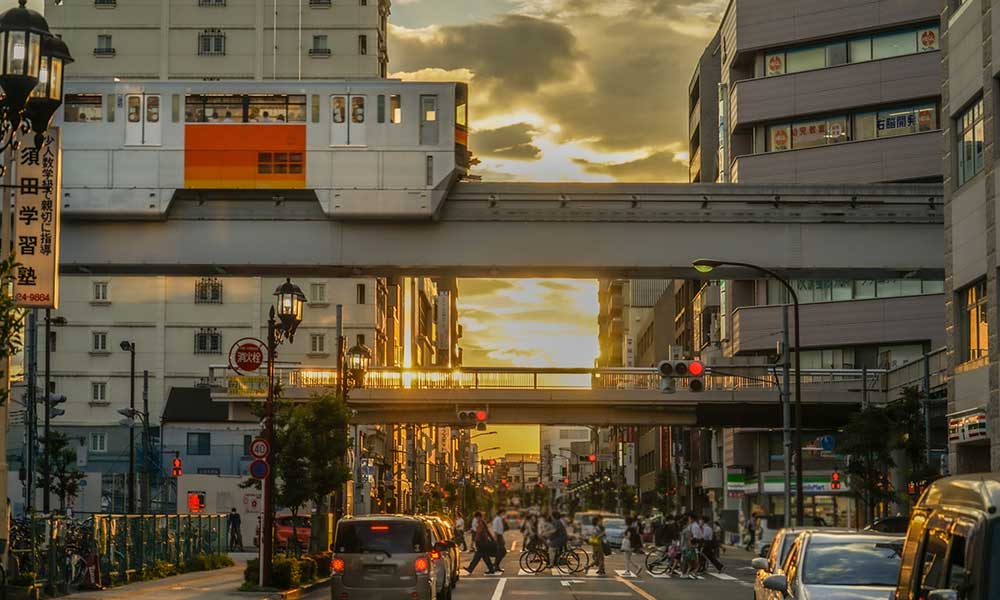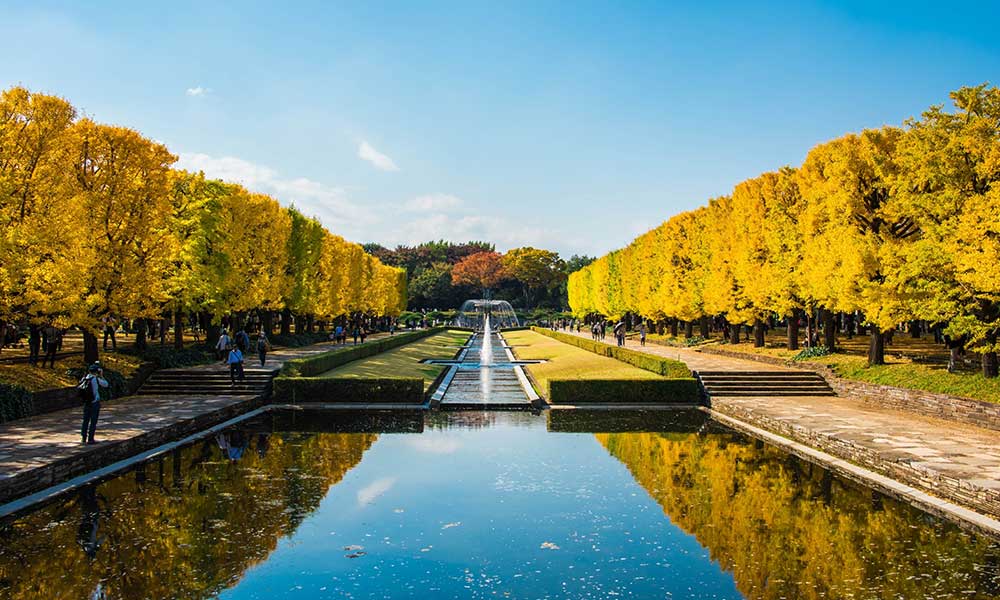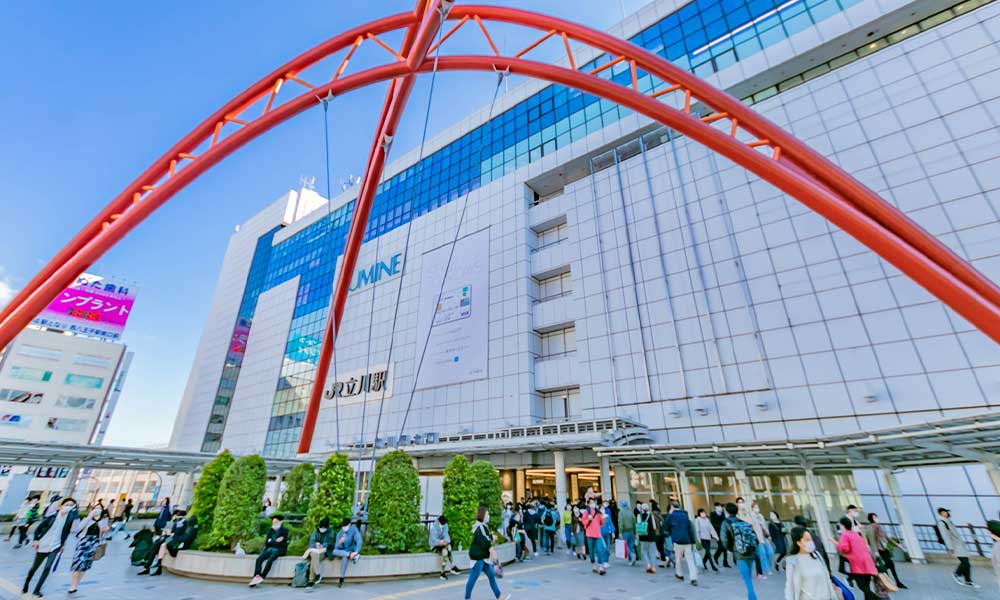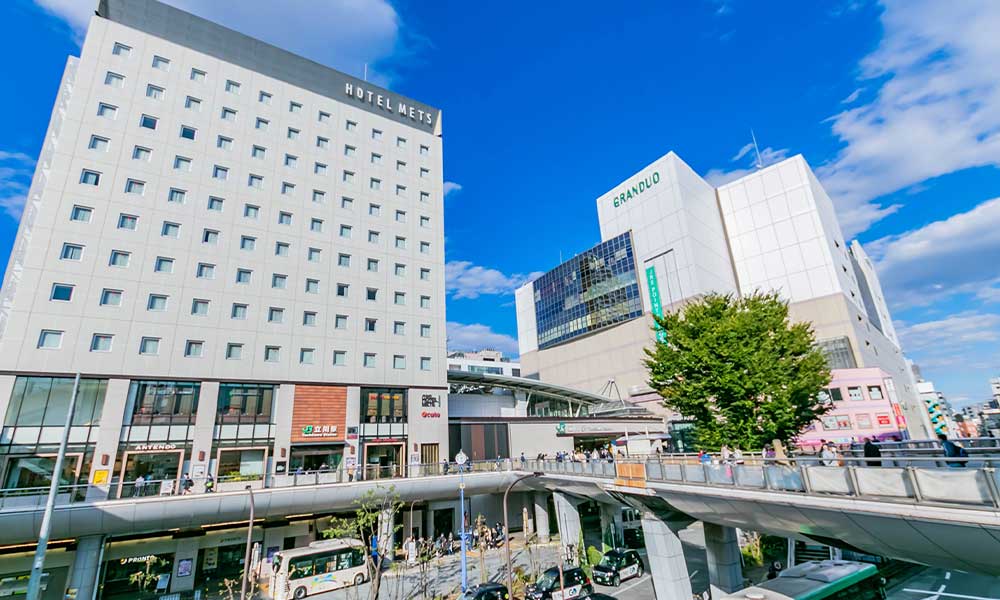Tachikawa City, Tokyo東京都立川市
Living in Tachikawa City, Tokyo

We have Summarized the livability of Tachikawa City, Tokyo.
KITATAMA AREA北多摩地域
-
- TACHIKAWA CITY 立川市
-
- NISHITOKYO CITY 西東京市
-
- MUSASHINO CITY 武蔵野市
-
- HIGASHIKURUME CITY 東久留米市
-
- MITAKA CITY 三鷹市
-
- CHOUFU CITY 調布市
-
- KOMAE CITY 狛江市
-
- KIYOSE CITY 清瀬市
-
- HIGASHIMURAYAMA CITY 東村山市
-
- KODAIRA CITY 小平市
-
- KOGANEI CITY 小金井市
-
- FUCHUU CITY 府中市
-
- KOKUBUNJI CITY 国分寺市
-
- KUNITACHI CITY 国立市
-
- HIGASHIYAMATO CITY 東大和市
-
- MUSASHIMURAYAMA CITY 武蔵村山市
-
- AKISHIMA CITY 昭島市
CONTENTS
- What kind of place is Tachikawa City, Tokyo?
- Tachikawa CityPR video
- How is the traffic situation in Tachikawa City?
- How are the rent and land prices in Tachikawa City?
- How is childcare and education in Tachikawa City?
- How about shopping in Tachikawa City?
- How about jobs and recruitment in Tachikawa City?
- Tachikawa City’s unique subsidy/subsidy system
What kind of place is Tachikawa City, Tokyo?

Tachikawa City: A city where culture and commerce intersect and has a wide range of attractions
Tachikawa City is located almost in the center of Tokyo, slightly west of it, and has an area of approximately 24.36 square kilometers.
It borders Musashimurayama City and Higashiyamato City to the north, Kodaira City and Kokubunji City to the east, Kunitachi City and Hino City to the south, and Akishima City and Fussa City to the west.
The population is approximately 185,000, and the number of households is approximately 96,000. (As of May 2023)
The Tama River flows to the south, and the Tama River Aqueduct flows to the north, making the terrain mostly flat and gently sloping.
There are various theories about the origin of the name Tachikawa City, including one that says it comes from the Tama River, which flows east-west, being called “Tate no Kawa” (vertical river), and another that says it comes from the fact that there was a mansion (tachi) at Fusaiji Temple, but the details are unknown.
Tachikawa City’s history dates back to the Edo Period, when it was a peaceful area with villages along the Koshu Kaido and Itsukaichi Kaido roads.
In the Meiji Period, the area was renamed from Shibasaki Village to Tachikawa Village, and the Kobu Railway was opened, gradually forming a city. Tachikawa Airfield was opened in the Taisho Period, and after the war, a US military base was established there. It was famous as a “US military base town” until it was completely returned in 1977.
After that, urban development using the former base sites began, and development accelerated.
Today, Tachikawa City is a popular commuter town, with commercial facilities and office buildings lined up around Tachikawa Station, which boasts the largest number of passengers in the Tama area, and good access to the major cities of Tokyo and Shinjuku.
The symbol of Tachikawa City is the vast national park, National Showa Memorial Park, built on the former site of Tachikawa Airfield. The park is packed with family-friendly facilities such as the Rainbow Pool and Children’s Forest, as well as a Japanese garden and the Emperor Showa Memorial Hall, making it a fun facility for people of all ages.
The National Institute of Polar Research’s Antarctic and Arctic Science Museum is located close to Showa Memorial Park, and is a science museum with numerous exhibits on research into the Antarctic and Arctic, as well as footage of the aurora and live footage from Showa Base.
The Tachikawa Festival National Showa Memorial Park Fireworks Display is a famous festival in the city. This festival, held every summer, has been going on for over 60 years and attracts over 700,000 visitors every year.
PR video of Tachikawa City, Tokyo
Tachikawa City Promotion Video [Near Future Edition]
Tachikawa City Promotion Video [Eternity Edition]
FARET TACHIKAWA PR
How is the traffic situation in Tachikawa City?

Tachikawa City is a city with easy access to the city center, with a wide range of train and bus services.
There are 6 train lines and 12 stations in Tachikawa City. The shortest journey from Tachikawa Station to Tokyo Station is about 41 minutes, and the shortest journey to Shinjuku Station is 25 minutes.
| Tachikawa Station | JR Nambu Line・JR Chuo Line・JR Ome Line |
| Sunagawa 7th Station | Tama Monorail |
| Tachikawa Kita Station | Tama Monorail |
| Tachikawa Minami Station | Tama Monorail |
| Tachihi Station | Tama Monorail |
| Takamatsu Station | Tama Monorail |
| Seibu Tachikawa Station | Seibu Haijima Line |
| Nishi-Tachikawa Station | JR Ome Line |
| Shibasaki Gymnasium Station | Tama Monorail |
| Nishi-Kunitachi Station | JR Nambu Line (Kawasaki – Tachikawa) |
| Musashi-Sunagawa Station | Seibu Haijima Line |
| Izumi Gymnasium Station | Tama Monorail |
Local buses available include Tachikawa Bus, Seibu Bus, Keio Dentetsu Bus, and Nishitokyo Bus.
You can also use the community bus “Kururin Bus,” which provides access to major facilities in the city at a relatively low cost.
There are no expressways or national highways accessible from within the ward.
It is very convenient with good access to Shinjuku Station and Tokyo Station.
The area around Tachikawa Station is prone to traffic congestion and crowded trains, especially during rush hour.
How are the rent and land prices in Tachikawa City?

Tachikawa City is a pleasant city with quiet residential areas, stations and residential areas.
According to information from a real estate information site, the average rent in the ward for a newly built apartment within a 10-minute walk from the station is about 76,000 yen for a 1K and 117,000 yen for a 2DK.
The average land price per tsubo is about 1.57 million yen per tsubo.
The average price of a newly built apartment is 54.14 million yen, the average area is 62.6 m2, and the average price per tsubo is 2.859 million yen per tsubo. (As of 2018-2022)
Tachikawa City is located in Tokyo and is an area with relatively convenient access to the city center. Therefore, there is a high demand for housing and the housing situation is active.
There are various types of housing, such as apartments, detached houses, and rental houses. Apartments are mainly built around Tachikawa Station and near the downtown area, and many of the buildings are relatively new. On the other hand, there are many detached houses and low-rise houses in suburban areas.
Rent prices tend to be higher around Tachikawa Station and in major areas. Although not as high as in the city center, it can be said that this reflects the good access and abundant living facilities. General rents and price levels tend to be slightly cheaper than in the city center, but can vary greatly depending on individual conditions and the location of the property.
Despite being close to the city center, there are many areas with plenty of nature and good living environments.
Because it is close to the city center, housing prices are relatively high. Demand is particularly high around Tachikawa Station and other areas with good access, and rents and property prices tend to rise.
How is childcare and education in Tachikawa City?

Tachikawa City: A city with well-developed educational institutions, child-rearing support, and local events
Tachikawa City has 30 nurseries, 12 kindergartens, 18 elementary schools, 10 junior high schools, 6 high schools, 4 junior colleges/universities, and 5 vocational schools.
For both outpatient and inpatient medical care, infants covered by the Infant Medical Care Subsidy System (Marunyu Medical Certificate) (until the first March 31st after reaching age 6) are fully subsidized. Children between the ages of 7 and 18 covered by the “Compulsory Education Children’s Medical Expense Subsidy System (Maru-ko Medical Certificate)” and “High School Student and Other Medical Expense Subsidy System (Maru-ao Medical Certificate)” (until March 31st after they reach the age of 18) are eligible for a subsidy of up to a maximum of 200 yen per visit from the self-pay amount for insured medical treatment, and are eligible for full assistance with prescriptions, hospitalization, and home care visits.
In addition, the income limit and the 200 yen self-payment fee are scheduled to be abolished from October 2023.
Child allowances are provided in the following amounts: 15,000 yen for children under 3 years old, 10,000 yen for the first and second child aged 3 or older and not yet entering elementary school, 15,000 yen for the third child and onwards, and 10,000 yen for junior high school students.
Tachikawa City also has a comprehensive support system of its own.
The “Mom and Dad Classes” are aimed at households expecting their first child, and include lectures on childbirth and how to bathe the baby afterwards.
In addition, as part of the financial support “Childbirth and Childrearing Support Project,” pregnant women who undergo a pregnancy support interview after notifying their pregnancy receive a childbirth support gift worth 50,000 yen, and households who receive a visit from the Hello Baby Project after childbirth receive a childrearing support gift worth 100,000 yen.
To support families with children, there are the “Family Friend Program,” where specialized staff members visit homes to give advice on child-rearing, and the “Child Short Stay Program,” where children can be looked after if a guardian becomes ill or hospitalized and is no longer able to care for the child.
At the “Child-rearing Plazas” in Tachikawa City, there are 13 playgrounds for parents and children before they enter elementary school. Dedicated instructors are available to give advice on child-rearing, and it is a place for parents and children of the same age to interact and participate in various events.
The “After-School Children’s Classroom” utilizes elementary schools in the city to provide a safe place for children to play and learn after school under the supervision of adults.
Tachikawa City is known for its comfortable living environment and comprehensive child-rearing support measures.
There are many public and private nursery schools, kindergartens, elementary schools, and junior high schools. It is highly regarded for its high quality education and for its well-established learning environment for children and students. It also places emphasis on special needs education and international education, and is able to accommodate a diverse range of children.
In addition, various measures are being implemented to support families raising children. For example, child-rearing support centers are being established, child-rearing information is being provided, and child-rearing consultation desks are being provided.
Local exchange events and child-rearing circles and other activities are also actively held, and there are ample opportunities for parents to interact and exchange information.
In addition, there are numerous parks and playgrounds, providing an environment suitable for children to play and exercise. There are large spaces and playground equipment, such as Tachikawa Park and the Tama River riverbed. In addition, facilities and commercial facilities in the ward also have indoor playgrounds and facilities for children.
Tachikawa is home to many excellent schools and educational facilities. Public schools are of high quality, and there are also plenty of private and international options. There are also a large number of kindergartens and nurseries, providing a great environment for children to receive their education.
The cost of education at private and international schools can be expensive, and some schools are known as preparatory schools and can be highly competitive.
How about shopping in Tachikawa City?

Tachikawa City is a city with an abundance of commercial facilities and a wide variety of shopping areas.
Tachikawa City has a wide range of commercial facilities centered around Tachikawa Station, providing a shopping environment that meets a variety of needs.
There are many facilities directly connected to the station, including Granduo Tachikawa, which has clothing, cosmetics, and stylish restaurants; Ecute Tachikawa, which is lined with a wide variety of shops; Isetan Tachikawa, which is popular for its high-end clothing and cosmetics and department store gourmet food; and Isetan Tachikawa, which has a wide variety of clothing and miscellaneous goods for young people. It is an area where you can go to “LUMINE Tachikawa” without getting wet from the station, and there are many shops to meet various needs, making it a fun area to shop.
There are also about 22 supermarkets in Tachikawa, including Peacock and Inageya, making it a convenient area for shopping for daily necessities and groceries.
Tachikawa City has many large commercial facilities and shopping malls, and is characterized by a wide range of products and convenient access.
Commercial facilities and popular areas may become crowded, especially on weekends and during events.
How about jobs and recruitment in Tachikawa City?
Tachikawa City: A city with a wide variety of job opportunities and convenient access to the city center
The average annual salary in Tachikawa is 4,040,000 yen.
Tachikawa has a wide variety of job openings due to its location near the center of Tokyo and good transportation access.
There are many commercial facilities and restaurants around Tachikawa Station, and many job openings in these industries. Salespeople, customer service staff, and cooking staff are in demand at department stores, shopping malls, restaurants, cafes, and hotels.
There are also many medical institutions and nursing care facilities, and many job openings related to medical care and nursing care. Jobs such as nurses, medical administration, and nursing care workers are in demand.
In addition, IT companies and technology-related companies are also concentrated in the city, and there are job openings for software engineers, system engineers, data analysts, and more.
It is close to the center of Tokyo and has good transportation access, making it an easy area to commute to work or school. There are also many job openings in a variety of industries, so you have plenty of options.
There may be a large number of applicants compared to the number of job openings. In particular, in some popular industries and occupations, the job offer ratio may be high. This can lead to fierce competition and make it difficult for job seekers to obtain a job.
Tachikawa City, Tokyo’s unique subsidy/subsidy system
Tachikawa City, Tokyo’s unique housing assistance and subsidy system
Tachikawa City, Tokyo’s unique childcare support system
| Childbirth and child-rearing support program Pregnancy support interview First Birthday Support |
Tachikawa City, Tokyo’s unique system for further education and tuition assistance/subsidies
| School support School attendance incentives for special education Loan Program to Support Exam Takers |


















